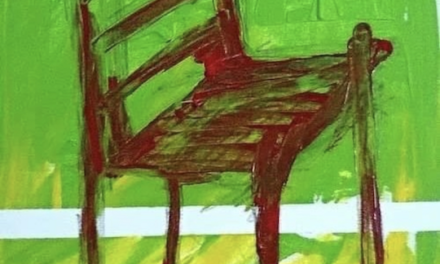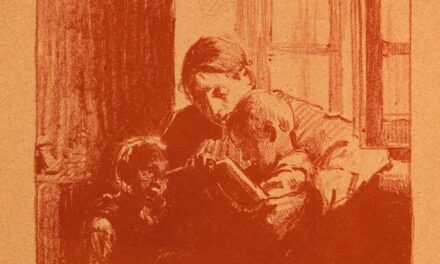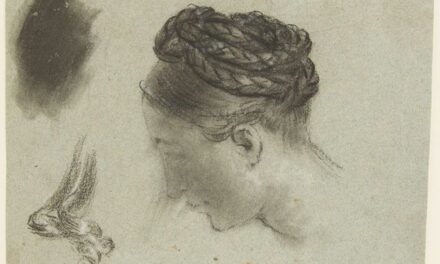Kandinsky, Vasily. Institute of Chicago.
Blue Madonna
by Sara Kachelman
They keep the water too warm at the YMCA. The woman sits there with her feet in the indoor pool, feeling fat. The lights reflect on the white tile and the water. Outside it is dark already. The cars slide on the ice. The woman braces herself to slide into the water but folds back up. She’s gotten so fat. A wad of cream cheese, floating there in the water, taking up a whole lane. She can’t do it. She waits.
The woman’s daughter, blond, soon to be fat, is having her swimming lesson in the shallow end. She crouches with the other children against the far wall. That high school girl is teaching them how to move their arms around in the water.
The woman knows her daughter’s dimpled arms, knows her hands. Wide and short with little oval claws. Smooth, thick wrists. She watches her daughter splash and play. The funniest thing in the world, she thinks, is a line of bald mammals swimming in a bowl of chemical water. The funniest thing in the world, she thinks, is the sight of her giant breasts struggling to defeat one another in a size medium swimsuit patterned with blue roses. She doesn’t know if blue roses exist in the wild, and that is funny, too.
The woman has a stressful job at the Department of Motor Vehicles. She is too young to work there. Thirty. Do you know what salt does to fish?
She is waiting for her daughter to finish learning how to swim so that she can spend her Tuesday nights with a new television series called “Detroit Hotbox,” about the police officers. The interracial relationship possibilities have the potential to make it through four seasons without exhausting the initial appeal. She can already tell, from the commercials, who is going to get shot. This, while her daughter sits on the carpet with her handheld video games, shooting bullets at verbs, adjectives, nouns.
The woman is waiting to sit in a recliner with a plate of corn chips and a book of unworked Sudoku puzzles. She owns two vibrators, a new one and an old one, and they do different things, but neither is very good, sequentially, in unison, or alone. If there existed a breed of small dog that only slept. If there existed a breed of attractive young police officer that would live with her and scratch the back of her head, just above the neck, under the hair. He will wear a clean white undershirt and plaid underpants. She would take a fat one. This is what the woman wants, to heap her boredom onto someone else and look at it, complacent.
The woman is still sitting with her feet in the YMCA pool. Hasn’t moved an inch. She interrogates her body, knowing exactly what it all looks like. She shaved her legs yesterday and still there are dark pricks puckering out of the skin that appears in some places pale blue, and in other places gray. Her thighs, flattened against the tile, resemble undercooked pancakes. Her toes pedal around in the water.
The woman has nothing to do. She can’t get in the pool, not with that boy in there. There is now a boy in there. He walked out of the showers and jumped into the pool and is now swimming aggressively back and forth. He’s driving age or past it, not dark enough to be black or white enough to be full-white, but the woman can’t tell. It doesn’t matter. She feels ugly, too tall, a streetlamp.
The children are over there blowing bubbles. One child, a towheaded boy, is too scared to do it. The high school girl pushes his head down into the water and he comes up screaming. The woman resolves that she should have gone to the yoga class, which ends at the same time as the swimming lesson. She resisted this time because she did not like all those flexible men showing off. The woman does not like the idea of flexible men.
In the lobby the people are wet-headed from the showers, putting on their coats, their hats. Behind steamed glass panels the woman watches families disappear. Each spine tenses to meet the cold that rushes through the automatic doors. They are all going home to watch “Detroit Hotbox,” she knows it.
The woman is mad. There are no chairs or tables around, no chance to retreat. It is a size medium swimsuit she is wearing and her breasts are bound to jump out any minute. But she can’t dress in her street clothes, she’d have to wait outside in the windy lobby, would have to suffer as the yoga men pass by sneeringly. What would happen if she plunged in ten feet deep, her soft arms windmilling down the lanes, insides spilling out like solution from a spoon? She tries to fold into herself. She crosses her legs, waiting for the children to come out of the pool.
The boy, who all this time has been gliding back and forth under the water, resurfaces.
“Lost my earring,” he says, massaging his ear. His voice is lazy. Could be drugs, could be stupid. “You see it from up there?”
The woman crosses her legs tighter and looks out over the water.
“What is it?” she asks.
“An earring. A diamond.”
They peer down at the murky water but both know that it’s hopeless. The boy climbs out of the pool, his dark trunks sticking to his thighs, and walks around the perimeter of the pool. Two soft patches of hair on each shoulder blade, nearly imperceptible. She has now convinced herself that he is in fact a dark-skinned white person rather than a light-skinned black person. She is now trying to decide which side of town he could belong to, and finds this to be the real challenge. It doesn’t matter.
“Wanna play a game?” he calls over to the woman.
“I don’t think so,” she says, shaking her head.
“If you find it, you can keep the other,” he says, pointing to his diamond-studded ear. “I’m gonna try to dive for it.”
“I don’t want to get in,” she says. The boy halts.
“Well, what are you doin’ then?”
She shrugs.
“That’s dumb,” he says. The boy dives in and stays under for a long time. When he comes back up, he looks at her and shakes his head. Dry run.
“How come you can swim so well?” she asks him, then feels embarrassed that she was watching.
“Fish lungs,” he tells her.
The woman’s lips flatten. “Is that so,” she says. Her movements become affected as if she were very tired. She should want him to go away.
“Yeah, I don’t ever have to come up if I don’t want to,” he says, breaking into a smile. He walks away, his hips moving easily.
She imagines how she must appear to him: a floral print schoolmarm, a divorcee at the nail salon, a line of cleavage behind a shopping cart, an adolescent challenge. He may be old enough to want to sleep with her, old enough for a permit. She feels like a bad woman and immediately forgets it. Can sexuality pulse operatic in water, or rise up out of chlorine steam? She doesn’t know if anyone can hide it. She is too young to work at the Department of Motor Vehicles. She is too young to wear that awful collared shirt, straining, as always, at the buttons. It has been so long, so long since she’s had the upper hand.
The woman rests on her braced arms and pushes her breasts forward. She decides to play the game.
“I have a talent, too,” she says. “I can explode.”
“Explode?”
“Into a thousand pieces,” she says.
“What kind of pieces?” the boy asks, moving away and turning back to look at her.
“They’re hot,” the woman says. “And stretchy.”
The boy refuses to be had. He keeps his distance. “What does it feel like, the before?”
“Like an oven set with an egg timer.” The woman’s mother had had one of those. Real women, or the one she was pretending to be, would know about ovens.
He thinks about it for a minute. “What about when you do it? When you explode?”
The woman gathers up her breath. “I haven’t done it yet,” she exhales.
The boy swims another lap, the slick arms cutting into the water, a shark! The woman tries hard not to watch him but there is nothing else to look at, not the cities of hair that are cropping out on her legs, her legs like whale fat, her legs like shark meat. And then, there, the boy is back. “What’s your name?” he asks.
“I don’t have a name,” says the woman.
He cackles and grins down at his thin, dark chest. “My name’s Fabio Rimspinna! From Compton.”
The woman’s drawn-in eyebrows raise up. “And I’m Lady Madonna,” she says. She does not know where Compton is.
Ceremoniously, the boy dunks himself backwards and draws up to the surface again. “Blue Madonna put the baby down,” he murmurs.
“What?” says the woman.
The boy makes a quiet chuck of disappointment and slaps the water with his hands. It sprays the front of the woman’s swimsuit and she grabs at it with her fingers.
“Look what you’ve done,” she says, an actress, a girl from a poster hoping to fool him.
“What kind of young man wears earrings?” she barks at him, and the boy can tell from the arched eyebrows and the curve of her back that she is playing someone else.
“Gang biz,” he says.
“You tell that to strangers?”
“You ain’t a stranger,” mutters the boy, and the woman panics, tries to remember where she would have seen him, waiting in line for a license, license suspension, reinstatement, just a kid, barely old enough to jerk off—
“You’re Madonna,” he says. “I know you anywhere.”
The woman swallows. She figures she should say something. “They’re real? The diamonds?”
“They’re the compressed ashes of fake-ass wankstas,” says the boy. Well. The woman sits there. “I popped ‘em,” he says. He fingers his earring. “Sometimes it looks like a eyeball.”
Again, there is nothing to say. The woman whimpers, “We live in Iowa.”
The boy snorts. “I’m getting out of here. Too many white people.”
“I can see that,” says the woman, not knowing exactly what she means.
“Which is yours?” he asks.
“Which is mine?”
“Which kid?”
The woman tries to adjust one of her straps without bringing attention to her breasts, which have pressed between them a faint dark line. The woman closes her legs tighter, draws up into herself. She can never make herself small enough. She tosses her head. The bones in his face are beautiful. In the other corner, the children are holding their noses at the edge of the pool. They jump in, arms and legs slipping through the warm chemical air.
“None of them,” she says faintly.
“I bet it’s that fat girl with the blond hair,” he says.
“It is not,” she says. She risks a glance but the boy isn’t looking at her to see if she is telling the truth.
“Her name is Mattie Grace and she’s gonna marry a Baptist song leader,” says the boy.
The woman sucks in her stomach and glares at him. “Why should I talk to you, anyway?” she tosses at him.
The boy shrugs. “Why you here if ain’t gonna swim?” She zeroes in on his large dark eyes.
“Where are your parents?” she demands.
“Aren’t you going to get into the water?”
“Your mother?”
“Africa, would you believe it? Where are your parents?”
The woman purses her lips. She looks through the glass doors at the families walking around in the YMCA lobby. In the shallow end, the children are holding onto the wall and kicking their feet behind them. She thinks about sitting in one of the chairs in the lobby but she feels as if she has entered into a pact with the boy, a pact of strange prejudices. Moving would be a submission. Move, and she would admit everything.
“Hell,” she spits at him, the muscles in her face working hard to make herself hideous. “My parents are in hell.” She searches his face for disbelief, but again there is nothing.
“My parents are child-rapists,” says the boy, bending his arm in an elegant back-stroke.
“Well. My husband is a child-rapist,” says the woman, fighting to control the corners of her mouth. She sees him for a minute, this husband in his clean undershirt, but she can never decide on a face, and loses him. She realizes how tired she is, what a drain it is, coming here! As if any child needs to learn how to swim anymore.
“No, he isn’t, he sells insurance downtown,” says the boy, “And you have a big car, a big van like a potato, and you bake casseroles for dinner, and take the fat girl to her recitals, buy her the extra large leotard,” says the boy. “Don’t you.”
The woman yanks up the front of her swimsuit to hide the breasts, which are beginning to stretch the blue flowers beyond recognition. Chill bumps spot her fleshy white legs. She glares past him at the prim children, the clean pale babies splashing on the other side of the pool. She imagines a trapdoor forming underneath her flattened hips. She wishes she could take the children with her.
He has turned away from her. “Makes no sense,” he says, “to go to a pool and not get in the water.” The boy pushes himself away from the wall. The water slides off of his smooth back and the woman, watching the gentle grace of his arms as they glide through the water, feels guilt. She wants to call him back to her, but he swims farther and farther away until there is only the smooth dome of his head.
The woman begins to sweat, and the fabric of her swimsuit clings tighter and tighter to her skin. Her hips and breasts push on the outstretched flowers, pale roses stretching white in the strain. The pressure balloons under her skin, exposing with its thin elasticity the pale veins streaming underneath. She has entered the car and the car will crash, she knows, and the hungry mouths inside of her will burst into the ice, hissing with quiet satisfaction. The woman feels this as she loosens her grip on the tiles. And the boy with his dark expression turns back to her, that boy who was looking for something.
“I ain’t getting out until you get in,” he challenges from the middle of the deep end. “Now how long can you hold your breath?” And he goes under to wait.
Sara Kachelman’s work has been published in Hobart Online, Liminoid Magazine, and Cactus Heart. She studies English at the University of the South.






